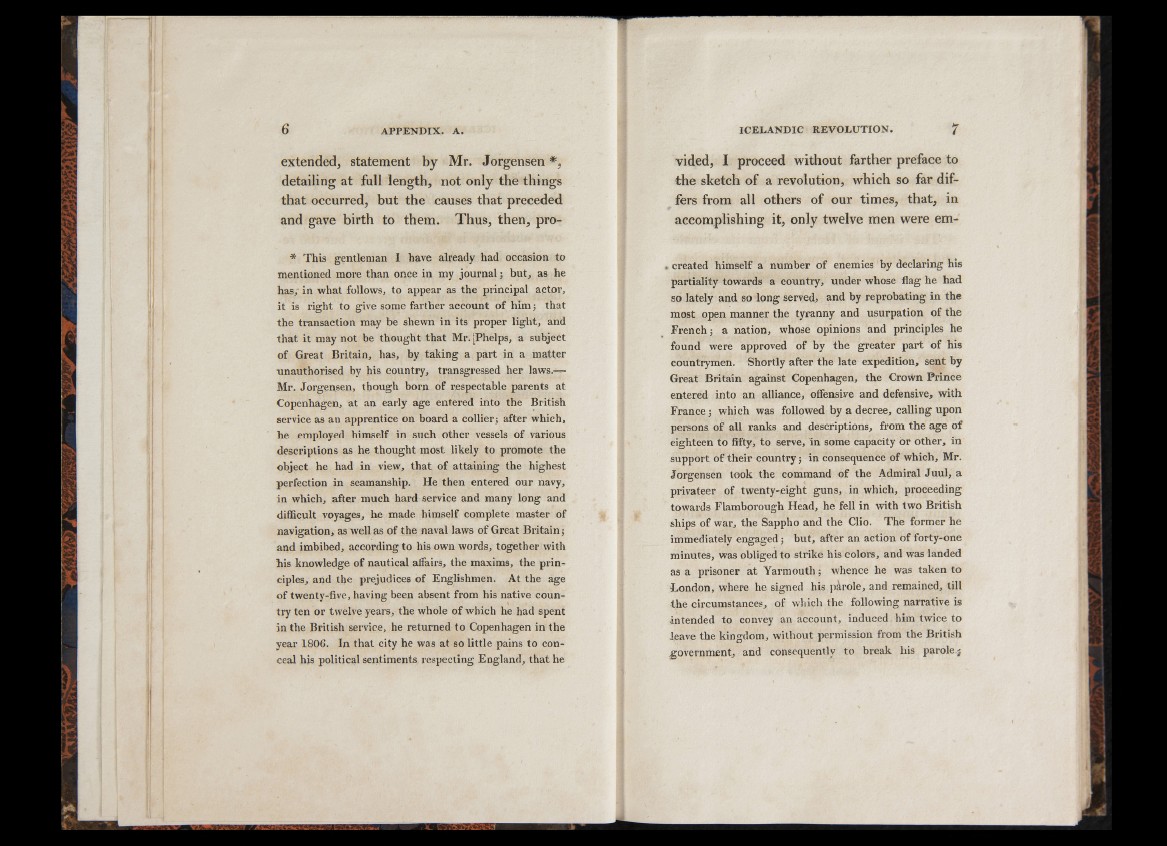
extended, statement by Mr. Jorgensen
detailing at full length, not only the things
that occurred, but the causes that preceded
and gave birth to them. Thus, then, pro-
* This gentleman I have already had occasion to
mentioned more than once in my journal; but, as he
has/ in what follows, to appear as the principal actor,
it is right to give some farther account of him ; that
the transaction may be shewn in its proper light, and
that it may not be thought that Mr. [Phelps, a subject
of Great Britain, has, by taking a part in a matter
unauthorised by his country, transgressed her laws.—
Mr. Jorgensen, though born of respectable parents at
Copenhagen, at an early age entered into the British
service as an apprentice on board a collier; after which,
he employed himself in such other vessels o f various
descriptions as he thought most likely to promote the
object he had in view, that of attaining the highest
perfection in seamanship. He then entered our navy,
in which, after much hard service and many long and
difficult voyages, he made himself complete master of
navigation, as well as of the naval laws of Great Britain;
and imbibed, according to his own words, together with
his knowledge of nautical affairs, the maxims, the principles,
apd the prejudices of Englishmen. At the age
of twenty-five, having been absent from his native country
ten or twelve years, the whole of which he had spent
in the British service, he returned to Copenhagen in the
year 1806. In that city he was at so little pains to conceal
his political sentiments respecting England, that he
vided, I proceed without farther preface to
the sketch of a revolution, which so far differs
from all others of our times, that, in
accomplishing it, only twelve men were em-
, created himself a number of enemies by declaring his
partiality towards a country, under whose flag he had
so lately and so long served, and by reprobating in the
most open manner the tyranny and usurpation of the
French; a nation, whose opinions and principles he
found were approved of by the greater part of his
countrymen. Shortly after the late expedition, sent by
Great Britain against Copenhagen, the Crown Prince
entered into an alliance, offensive and defensive, with
France; which was followed by a decree, calling upon
persons of all ranks and descriptions, from the age of
eighteen to fifty, to serve, in some capacity or other, in
support of their country; in consequence of which, Mr.
Jorgensen took the command of the Admiral Juul, a
privateer of twenty-eight guns, in which, proceeding
towards Flamborough Head, he fell in with two British
ships of war, the Sappho and the Clio. The former he
immediately engaged; but, after an action of forty-one
minutes, was obliged to strike his colors, and was landed
as a prisoner at Yarmouth; whence he was taken to
London, where he signed his parole, and remained, till
the circumstances, of which the following narrative is
intended to convey an account, induced him twice to
leave the kingdom, without permission from the British
.government, and consequently to break his parole;